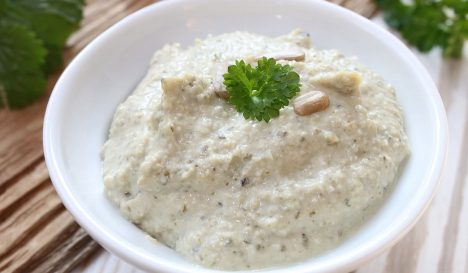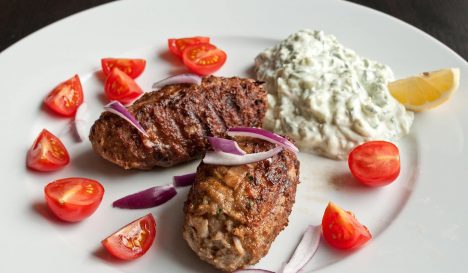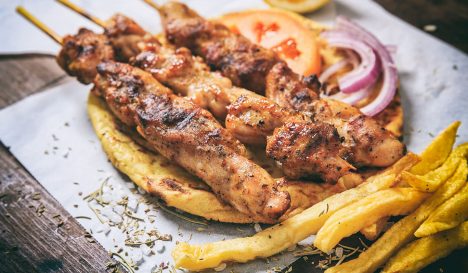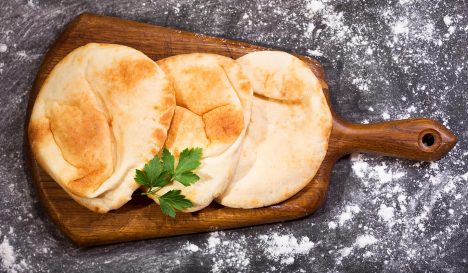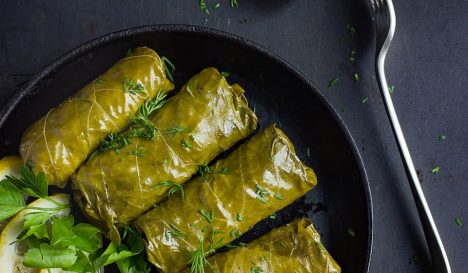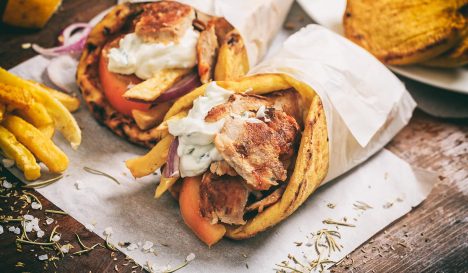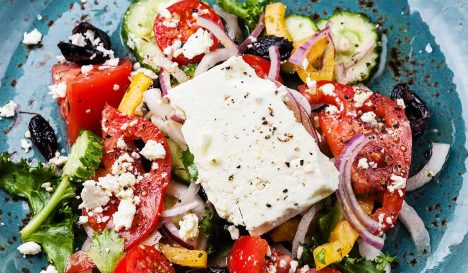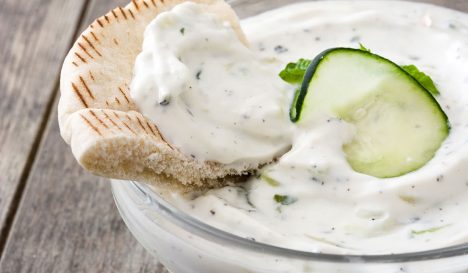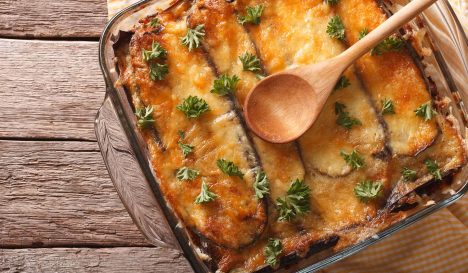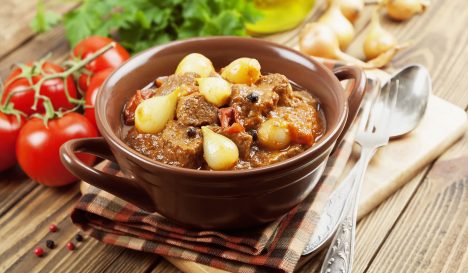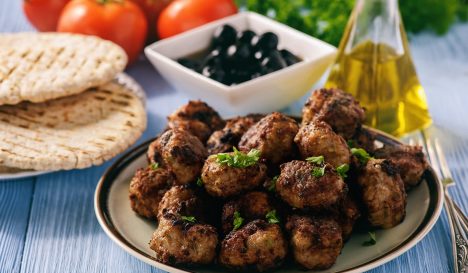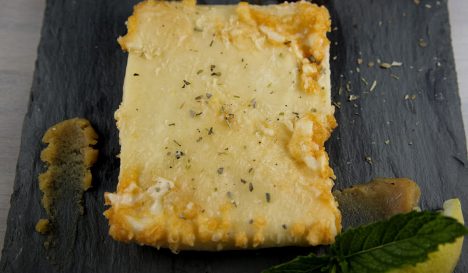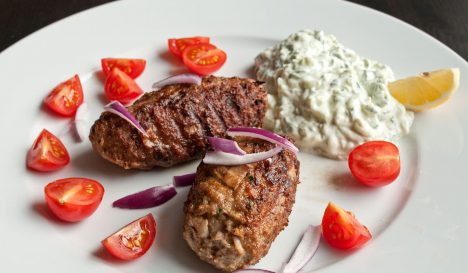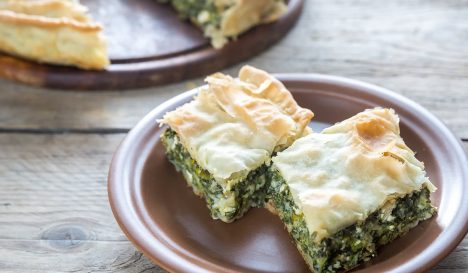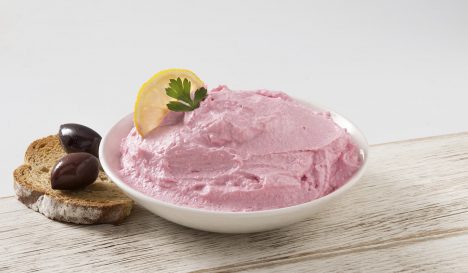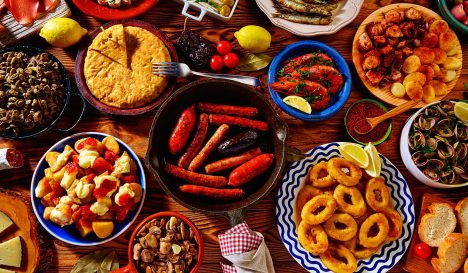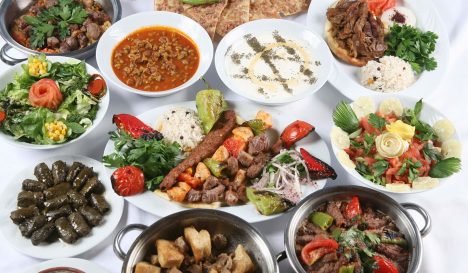Greek cuisine
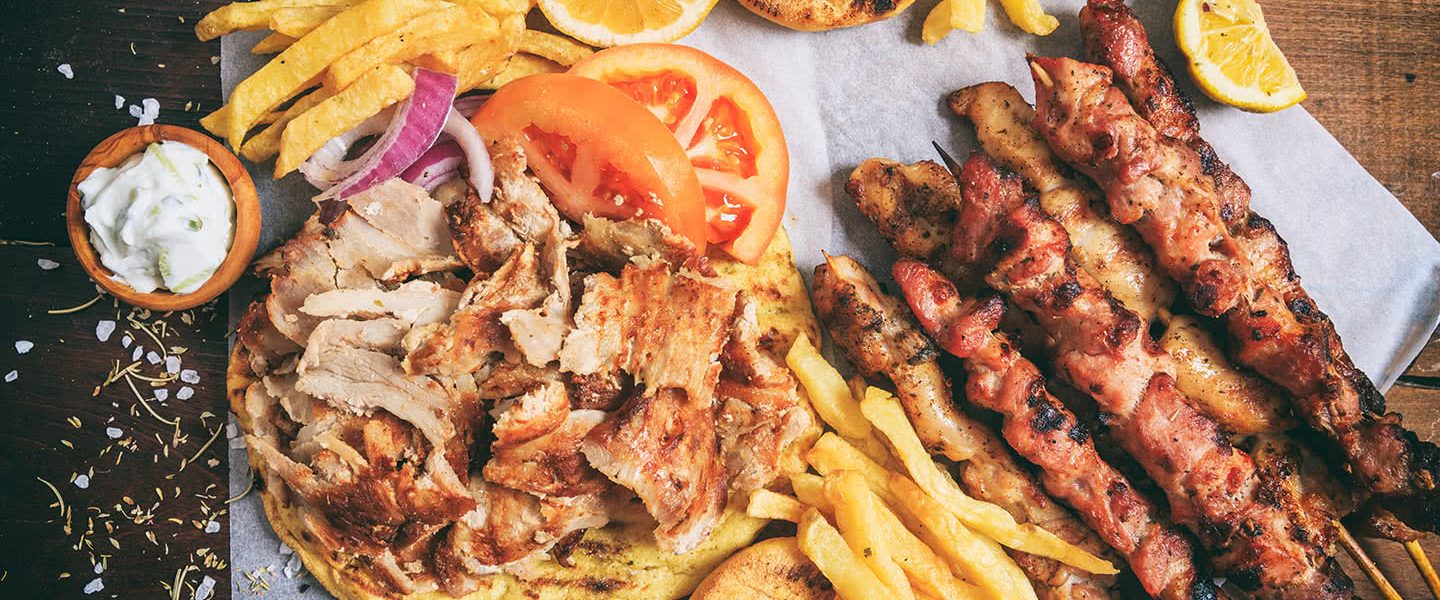
Greek cuisine is flavourful yet mild, elegant yet robust, diverse yet recognizable. A basis of ancient ingredients that can be traced back to ancient Greece – bread, olives and wine – is complemented with local seasonal treasures, such as fruit, nuts, legumes and herbs. The Greeks make countless types of cheese using goat, sheep and cow’s milk; just about every island has its own kind.
- Mountains and sea
- Reputation
- Outside influences
- Typical ingredients
- Greek tablemanners
- Greek cuisine in Canada
- For Beginners
- Discover these Greek dishes
Mountains and sea
Eighty percent of Greece consists of mountains and there are about six thousand islands included in her boundaries. The mountain slopes are the perfect environment for vines (plus vine leaves to make dolmades) and wild herbs. Given that you are never more than 145 kilometres from the coast in Greece, it is unsurprising that fish is often on the menu.
The “true” chefs of Greek kitchens are the mothers and wives of the country, who still spend most of their time in the kitchen. When families or friends come together to eat, it is the women who gather in the kitchen and prepare food whilst chattering, while the men raise their ouzo glasses and wait for what comes out of the kitchen. There are often many little “mezzes“, or snacks.
Reputation
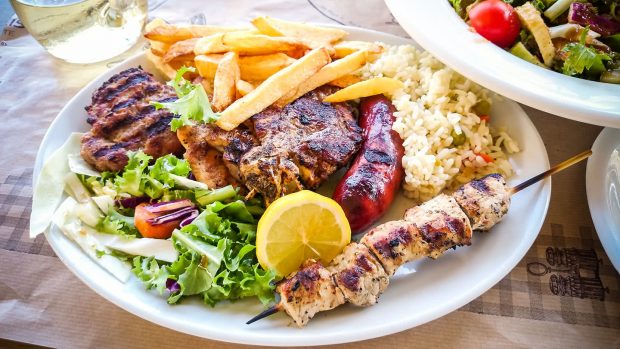
Greek cuisine has acquired a great reputation. Greek food has become the figurehead of the Mediterranean diet, which has encouraged people to eat like Southern Europeans since the fifties and sixties. Olive oil, vegetables, legumes, fish and yoghurt play a defined role in the “country kitchen” of a few decades ago and these ingredients endowed Greek cuisine with its healthy reputation.
In the meantime, the customs in the country have changed somewhat. Fast food has been introduced; people eat a lot more meat and you only have to look at a dish like saganaki and think to yourself that this is not something to eat every day. Fortunately, the pure, simple flavours have remained.
Outside influences
There is a lot of overlap between Greek cuisine and that of surrounding countries, including Turkey and the Balkans. This is unsurprising, given the (culinary) past of the region. For four hundred years, Greece and its surroundings were under the rule of the Turkish Ottomans. They not only introduced new dishes but refined the existing Greek dishes, giving them Turkish names. By the time Greece became independent in 1821, it was hard to distinguish between Greek and Turkish cuisines – and that is still the case. In both countries, they eat stuffed vine leaves (dolmades or sarma), meatballs (keftedes or kofte) and baklava. The exact origin of these dishes is still hotly debated.
Since then, under the influence of Chef Tselementes, the Greeks have tried to Westernise their kitchen. At the beginning of the twentieth century, there was a great demand among the elite of Athens for refined food, such as was eaten in France. Tselementes, who had worked in chic restaurants in Vienna and America, among other places, came up with a cookbook that laid the foundations of modern Greek cuisine and is still followed today. To give an example: we owe it to Tselementes that there is (French) bechamel sauce on top of moussaka. His basic dishes are still cooked throughout the country and are labelled as typically Greek.
That does not mean that there aren’t any regional variations. Each dish has its regional version, made with seasonal and locally available ingredients, a touch of creativity and the chef’s personal touch.
Typical ingredients

Greeks are proud of their olives and with good reason: Greece is the third largest exporter of olives. Greek olive oil wins prizes every year during the New York International Olive Oil Competition. The Greeks use their oil in just about every dish, from skordalia to spanakopita. Moreover, there is always a pouring bottle on the table so that everyone can add a little extra virgin olive oil to their own plate.
Greek oregano (rigano) is picked in the wild throughout the country; it grows like a weed on the many mountain slopes. The name oregano means luck (“ganos”) of the mountain (“oros”). The herb is used in almost all dishes on the Greek menu, from tomato sauces to cheeses, salads and fish dishes. The Greeks attributed a beneficial effect to oregano: “oreganothee” was believed to help heartburn and cough.
Whether you eat meat, fish, vegetables or cheese, a slice of lemon is always placed next to it. That lemon is not meant for decoration; you are supposed to squeeze it over your food. Chefs from all countries, from Oliver to Ottolenghi, agree: everything tastes better with a squeeze of lemon.
Greek tablemanners
• Water is just as an important part of the Greek meal as olive oil or bread. As soon as you sit down, you will be offered a jug or bottle of cold water and also with a cup of coffee or a dessert.
• Traditionally Greeks do not eat desserts. Sweet delicacies, such as baklava, are eaten with tea or coffee so that they can be optimally enjoyed.
Never order ouzo with your dinner. Greeks drink ouzo as a drink, with a snack of mezze (or five), but not with the main meal. Wine, beer, soft drinks and, of course, water are allowed.
• In Greece, restaurants are pretty informal. For example, you don’t have to choose all your dishes at the start of the meal. You sit down and order something. Then you learn the name of your waiter by heart so that when he passes by you can quickly ask for an extra Greek salad or a second portion of bifteki.
Greek cuisine in Canada
Canada’s great cultural diversity is never more on display than in the Greek community of Toronto. Taking a tour through that city’s famous Greektown on the Danforth is to experience a rich menu of Mediterranean dishes made from fresh, local ingredients. To experience some of that Greek deliciousness, try ordering from any number of Greek restaurants in the Skip app. Visit our cuisine page to discover Greek restaurants near you.
You can also experience this cuisine in Ottawa, the capital city of Canada. And if you live in Saskatoon, Sardinia Family Restaurant is a must-try if you’re feeling peckish for some homestyle Greek food.
For Beginners
If you are new to Greek cuisine, try the following and you will get a good overview of what the country has to offer:
Appetiser
Mezze – Dive headfirst into everything Greek by sharing a selection of mezze with your table companions. This also includes a drink, which has to be ouzo.
Drink
Ouzo – Ouzo complements a bowl of mezze well.
Main course
Bifteki – These meatballs filled with feta are juicy, flavourful and typically Greek.
Dessert
Baklava – As previously mentioned, the Greeks do not typically eat desserts, but if they do eat sweet foods, they love to nibble a tiny piece of crispy, sticky baklava.

